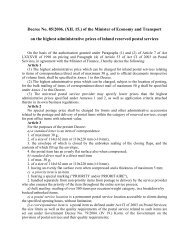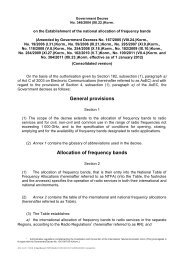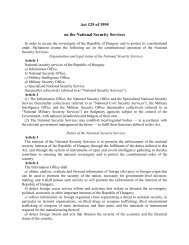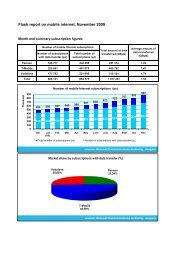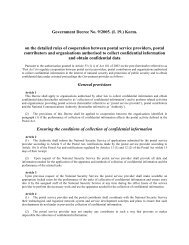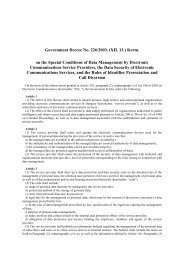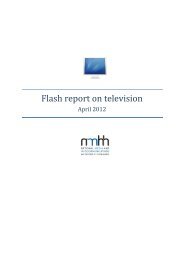The Hungarian Communications Market Developments and ...
The Hungarian Communications Market Developments and ...
The Hungarian Communications Market Developments and ...
Create successful ePaper yourself
Turn your PDF publications into a flip-book with our unique Google optimized e-Paper software.
<strong>The</strong> <strong>Hungarian</strong> <strong>Communications</strong> <strong>Market</strong> <strong>Developments</strong> <strong>and</strong> Regulation between 2004 <strong>and</strong> 2008<br />
SMP service providers submitted their new reference offers (RUO)<br />
to the Authority based on the new regulations. According to the decision<br />
of the Board of 7 October 2008 on RUOs, all service providers<br />
with significant market power, Invitel, Magyar Telekom <strong>and</strong> UPC, as<br />
the legal successor of Monortel, were to decrease their monthly tariff<br />
of full loop unbundling by nearly twenty percent, the monthly tariff<br />
of shared access by fifty percent on average. With respect to new<br />
reference offers, the shorter deadlines for execution <strong>and</strong> fulfilment of<br />
contracts as well as the mitigation of the administrative burdens of<br />
entitled service providers might speed up loop unbundling processes.<br />
In order to facilitate the performance of unbundling obligations<br />
in the way specified <strong>and</strong> by keeping of deadlines, the contractual<br />
system became more stringent <strong>and</strong> new elements were introduced.<br />
<strong>The</strong> wholesale broadb<strong>and</strong> access market<br />
With respect to the fact that competition based on unbundled access<br />
to the local loop did not work out for a long time at all <strong>and</strong> even<br />
recently has only played a marginal role, competition in the ADSL<br />
market could be ensured by way of bitstream access.<br />
<strong>The</strong> first round of market analysis<br />
NHH first carried out the analysis of the market “Wholesale Broadb<strong>and</strong><br />
Access” (market 12) in 2005 in accordance with the respective EU<br />
recommendation <strong>and</strong> related national regulations, by investigating<br />
bitstream access possibilities of alternative service providers.<br />
<strong>The</strong> decision of the Board defined five separate geographical markets<br />
in Hungary, which were identical to the service areas of former<br />
concession fixed telephone service providers. In these markets, the<br />
Board identified the incumbent service providers, i.e. Magyar Telekom<br />
(MATÁV), Invitel, Hungarotel, Emitel, <strong>and</strong> Monortel as having<br />
significant market power.<br />
Just like in the case of fixed telephone markets, the basis of the<br />
market power is the infrastructure owned by service providers that<br />
cannot be economically duplicated, that is, the local loop bottleneck.<br />
In its decision the Board established that a considerable rollout of<br />
new broadb<strong>and</strong> DSL networks accessible to consumers could not<br />
be realised economically on the part of newly entering service providers.<br />
Thus, service providers with significant market power in the<br />
wholesale market were able to squeeze out their competitors from<br />
the related retail market through refusal of access.<br />
<strong>The</strong> Board imposed access obligation for SMP service providers<br />
in the following two cases: at the local level at DSLAM <strong>and</strong> at the<br />
countrywide IP level.<br />
Nevertheless, different price regulations were introduced in relation<br />
to wholesale services with two access points.<br />
<strong>The</strong> prices of local bitstream access services were regulated by<br />
cost-based (FDC) price regulation as there was no real possibility to<br />
duplicate the associated infrastructure element (the local network),<br />
on account of such investment being not realisable economically.<br />
However, in the case of countrywide IP bitstream access services,<br />
a strict cost-based price regulation was not reasonable as new<br />
service providers also have the other infrastructural elements needed<br />
to provide services, consequently such elements can be duplicated.<br />
Moreover, such doubling in many cases has already been completed.<br />
In favour of the intensification of competition <strong>and</strong> to facilitate entering<br />
the market, the Board stipulated the application of the so-called “retail<br />
minus” pricing method (wholesale prices derived from retail prices).<br />
<strong>The</strong> main reason for the application of the “retail minus pricing”<br />
method was that in the case of fast developing new markets, where,<br />
through the spread of services <strong>and</strong> the decrease in average unit costs,<br />
end-user prices were also reduced, there was great danger that,<br />
through keeping the prices of the wholesale services providing the<br />
basis of retail services at a high level, service providers with significant<br />
market power could cause a price-squeeze thus excluding competing<br />
service providers <strong>and</strong> thereby completely preventing competitors from<br />
entering the retail market. <strong>The</strong> retail minus regulation is capable of preventing<br />
the realisation of a price-squeeze situation <strong>and</strong> consequently<br />
ensuring that, if operating in an adequately efficient way, entitled<br />
service providers have the possibility of entering the retail market <strong>and</strong><br />
remaining there permanently with competitive offers 29 .<br />
<strong>The</strong> obligation of transparency primarily entails publication of the<br />
applied tariffs of broadb<strong>and</strong> access services provided by service<br />
providers with significant market power <strong>and</strong> the detailed conditions<br />
relating to planned changes in tariffs <strong>and</strong> the use of services. <strong>The</strong><br />
requirement of transparency also relates to technical parameters<br />
relating to access, the applied st<strong>and</strong>ards, <strong>and</strong> network topology,<br />
including the geographical location of wholesale access points.<br />
Through the obligation of transparency, the Board’s intention was to<br />
prevent non-price problems <strong>and</strong> instances of price discrimination.<br />
Through the introduction of the obligation of non-discrimination,<br />
the Board wanted to prevent certain trade practices of service<br />
providers with significant market power, whereby they apply such<br />
discounts in connection with a given wholesale service that can<br />
be mostly utilised only by the largest entitled service providers, in<br />
particular their own retail service providers.<br />
<strong>Market</strong> effects<br />
Penetration <strong>and</strong> shares<br />
Already in the years prior to the announcement of broadb<strong>and</strong><br />
wholesale market decisions (2003-2004), a significant volume of<br />
ADSLs were present in the market. At the end of 2003, 117 thous<strong>and</strong><br />
end-points were available for broadb<strong>and</strong> ADSL subscriptions across<br />
the country. At that time, service was provided by the five incumbent<br />
service providers having ADSL infrastructure (themselves or through<br />
their subsidiaries) to more than 62 percent of end-users, with the<br />
remaining 37.4 percent being provided by independent Internet service<br />
providers that used the wholesale bitstream products purchased<br />
from those incumbent operators.



